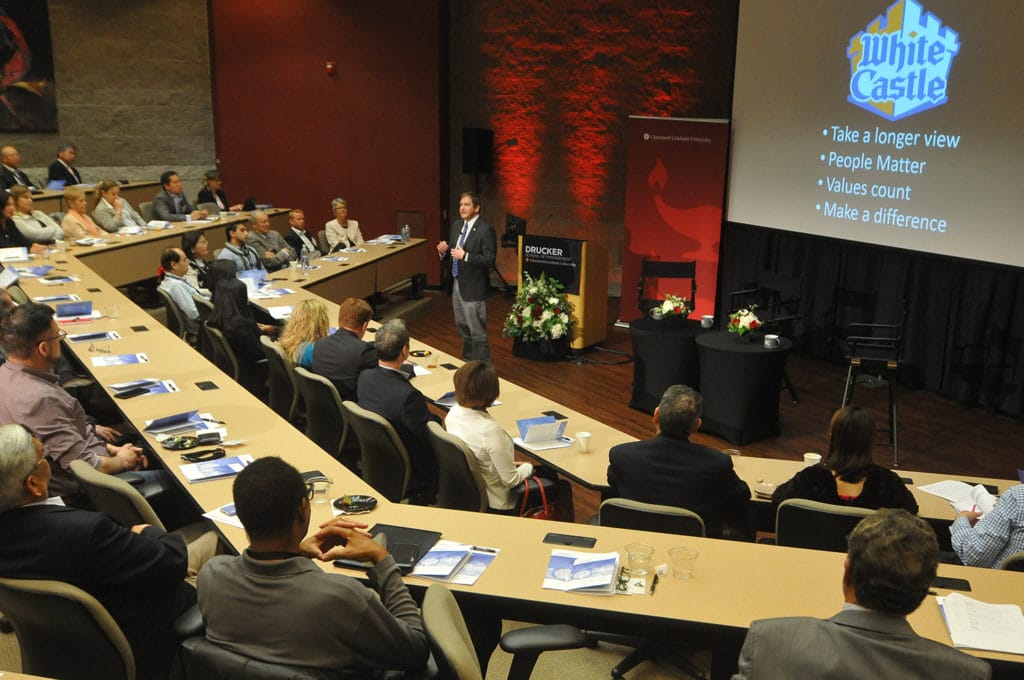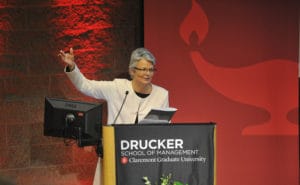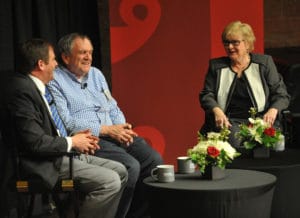New Institute Seeks to Serve Needs of Global Family Businesses

The White Castle Company has been around a long time—since 1921—but it gained an even wider awareness thanks to a 2004 movie that, well, isn’t exactly a modern masterpiece: Harold and Kumar Go to White Castle.
As keynote speaker for this spring’s launch of the Drucker School Global Family Business Institute, White Castle Vice President Jamie Richardson described talking to Bill Ingram, the company’s third CEO and grandson of the founder, after the movie company sent over the script.
“We thought the movie was going to be great,” Richardson told a large audience gathered in the university’s Albrecht Auditorium, “but my goodness, they failed to mention that it was rated R!”
Ingram, who stepped down as CEO after 43 years in 2015, calmly listened as Richardson expressed his fears that the film would reflect poorly on the company.
“It’s rated R for raunchy,” he told Ingram. “It has sex, drugs and rock n roll in it.”
Then, as Richardson recalled, Ingram asked him a single question: “Does the movie make fun of our team members?”
“No,” Richardson said.
Ingram nodded his head.
“OK,” he said, “then I’m fine with that.”
Richardson’s humorous anecdote not only demonstrates the pragmatism and calm marking Ingram’s 43 years at the company’s helm, it also shows how unexpected issues sometimes need to be addressed when it comes to a family-owned or family-run business.
Peter Drucker long recognized these unique tensions and dynamics, especially the issue of how succession will work, and deplored the fact that “management books and management courses … rarely as much as mention the family-managed business,” he wrote in 1995’s Managing in a Time of Great Change.
But the new institute is the Drucker School’s response to that lack of information.
Several hundred people gathered—in person and online—in April for the institute’s launch. The event featured, in addition to Richardson, institute founding member Andrew Chen (MBA ’11), Drucker Dean Jenny Darroch, Director for Japan and Drucker-Ito Relationships Koji Ogura, and a panel with Richardson, The Lewis Group’s Randall W. Lewis, and family business consultant Pat Soldano.
“The needs of family businesses are considerable, especially when we consider this at the global level,” explained Darroch to the audience. While 50% of American companies are family businesses, she said abroad that percentage is even higher: 85% in China and 97% in Japan.

Ogura said the new institute will offer a concentration in family business and courses that focus on governance and related issues to support the work of successors and representatives of family businesses around the world.
As a part of the new institute, Drucker’s Vijay Sathe, who is the C.S. & D.J. Davidson Chair and Professor of Management, is teaching a survey course on family businesses to provide students with a clear frame of reference for how these companies differ from others.
“Our institute is the best place for the next generation of a family business to enhance their skills,” said Ogura, who himself helped manage his family’s company in Japan for many years.
Joining the conference from Taiwan, Chen described the growing need for management training tailored to the needs of family businesses and said that he felt “blessed and thankful to be a part of the new program at the Drucker School.”

Typically, Soldano told the audience during a panel discussion with Lewis and Richardson, 75% of family businesses “don’t survive into the third generation because of communication issues among the siblings and other family.” Open communications and constructive debates are sometimes muddied by family dynamics.
Lewis, Richardson, and Soldano fielded a range of audience questions, including:
- If the family business has a board of directors, should it also have a family council for the family members? If so, how should this council interact with the board?
- If a family member isn’t working out in management, do you fire him/her or find another role for that person? How do you avoid practicing a double standard in the company?
- What happens if a buyer makes a major offer for the company but the family has serious communication problems?
- How do you handle succession, especially when a younger generation wants to implement changes?
Such questions, Richardson said, clearly show “the kinds of special factors most people don’t realize affect a family-run business.” His remarks echoed those of Drucker, who once wrote that a family business “requires its own and very different rules.” Without those rules, he warned, the business “will not survive, let alone prosper.”
For Lewis, whose Inland Empire-based family company was established in 1955 and oversees a range of real estate ventures and projects, the new institute’s global angle will be vitally important.
Too often, he said, companies remain insulated within their networks and communities, and that insularity can eventually threaten their survival.
“I want to learn from the city of Riverside, of course, but I’ll probably learn even more from what someone is doing in Taiwan or Australia, too,” he said. “With this institute, all the seeds have been put into place to really thrive as a concept. That is a key.”